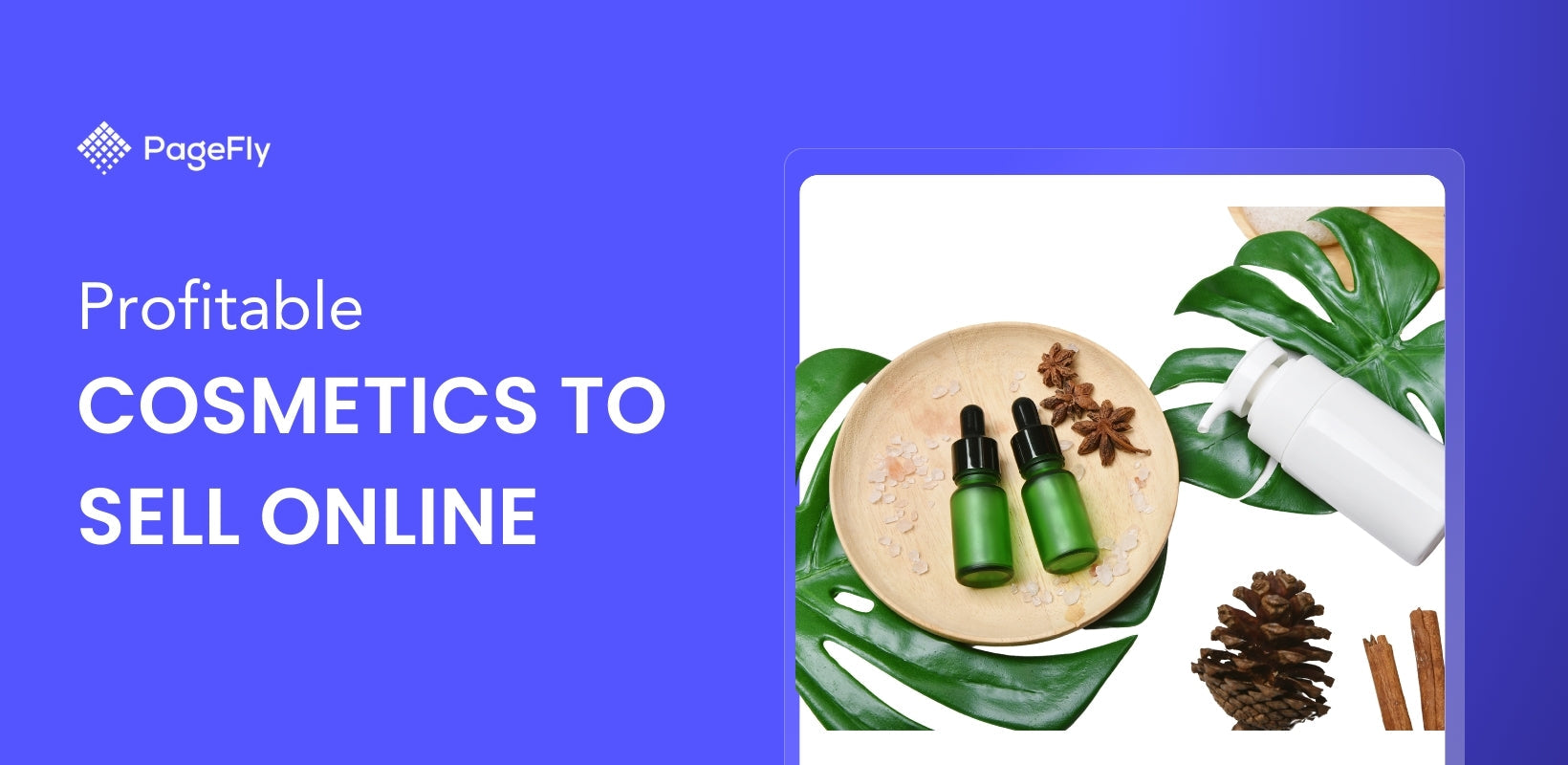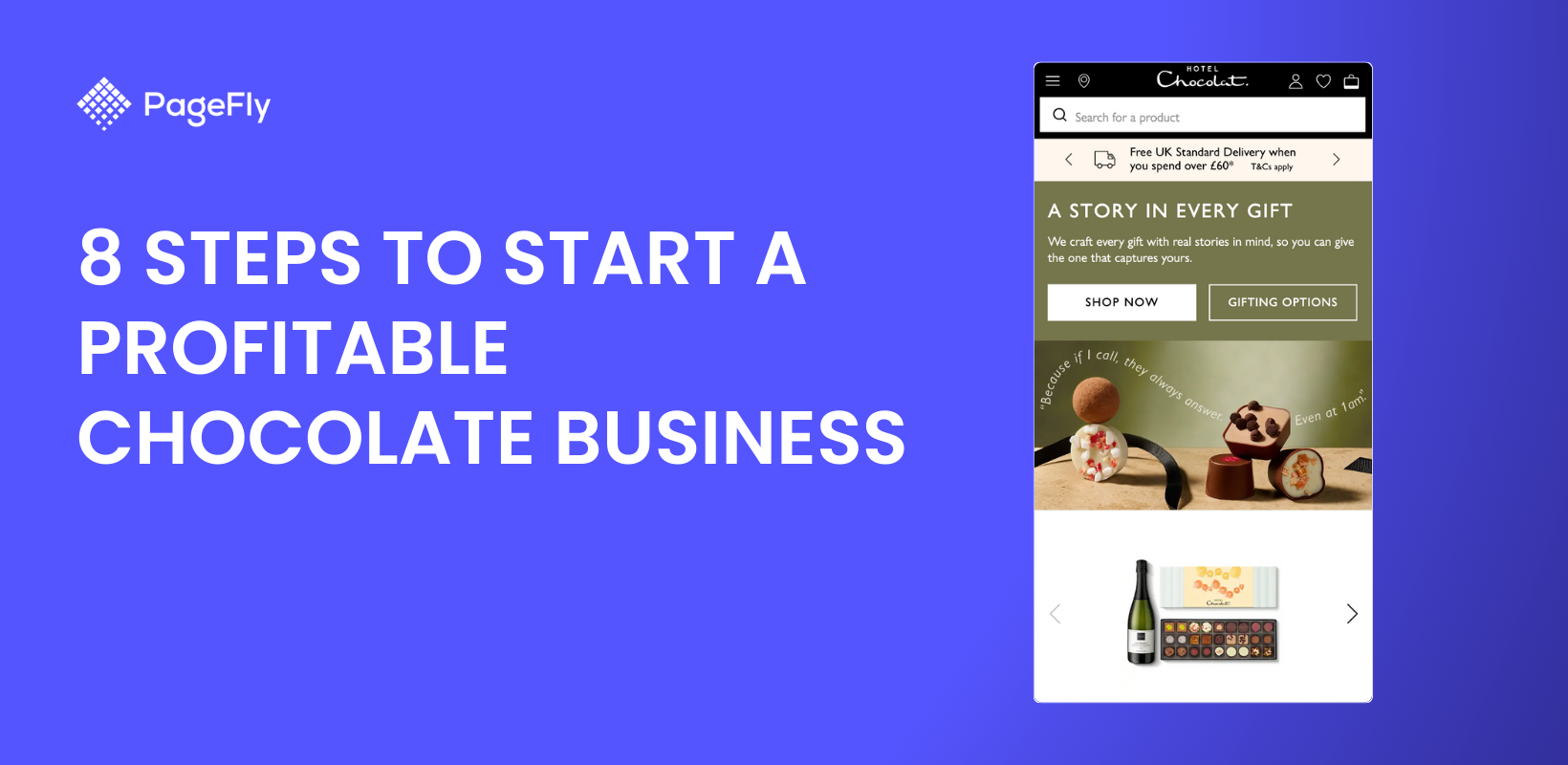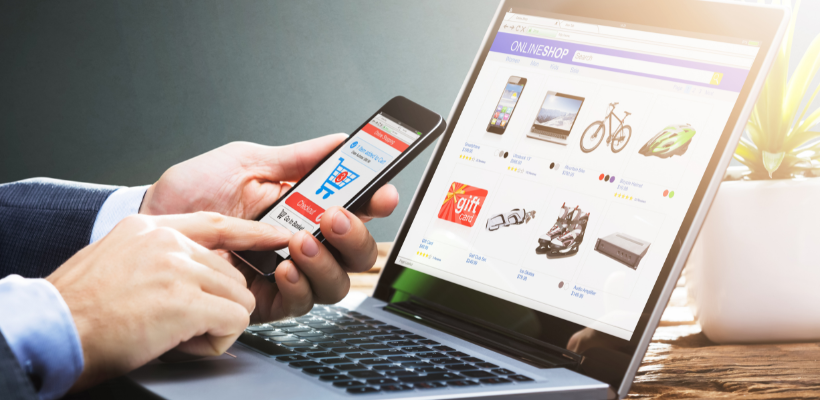Whether you want to sell moisturizers, masks, exfoliators, or skin-tightening products, there will always be a market for people who want to look their best and boost their confidence.
Furthermore, with many people looking to boost their self-esteem after spending months indoors, now is an excellent time to learn how to start your own skincare line.
We'll walk you through how to start a skincare line from scratch, with helpful tools and advice on how to build a successful skincare brand.
Outline
- Skincare Market Statistics
- What to Consider Before Starting a Skincare Line
- 9 Steps to Start a Skincare Business
- Top 9 Successful Skincare Business Examples
- Conclusion
Skincare Market Statistics
In 2023, revenue in the Skin Care segment is expected to be US$155.70 billion. The market is expected to grow by 3.91% per year (CAGR 2023-2027).
In global comparison, the United States generates the most revenue (US$21,090.00m in 2023).
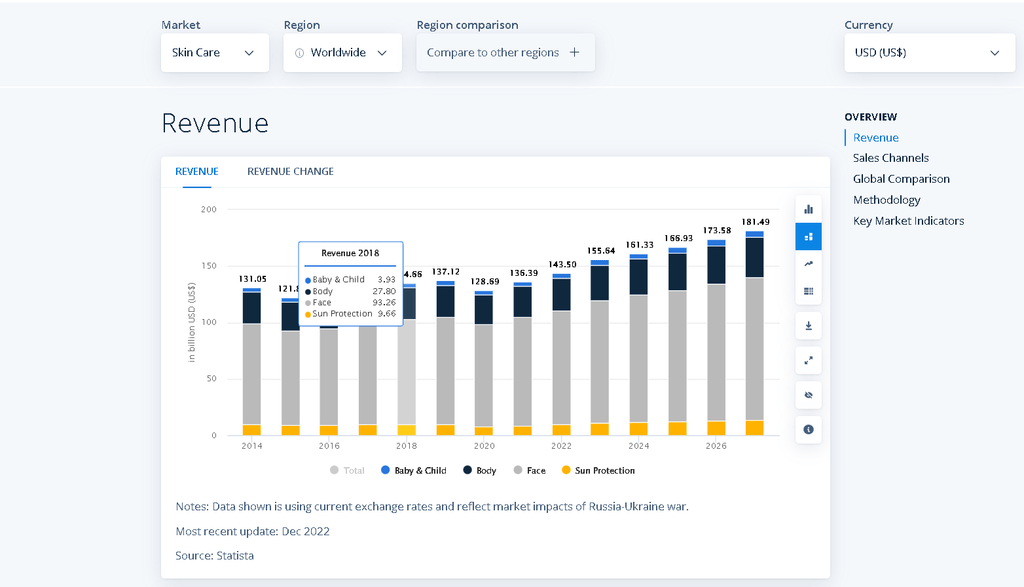
In 2023, per person revenues of US$20.24 are generated in relation to total population figures.
Non-Luxury goods will account for 72% of Skin Care segment sales by 2023.
The skincare industry is one of the most lucrative in the world. That's a fantastic opportunity for aspiring entrepreneurs interested in launching a skincare line!
What to Consider Before Starting a Skincare Line
Start-up Cost
In their first year, most businesses spend $40,000 on operations. This figure includes startup and maintenance expenses. Even if you intend to start a skincare business from home, you will need to make a small investment in materials, packaging, and other business expenses.
If you want to work with a manufacturer, expect to spend more money because many require minimum order quantities and product development can be costly. Dropshipping is an excellent low-cost option because it allows you to sell products manufactured by other companies without carrying inventory.
Knowledge on How to Start a Skincare Line
Creating your own makeup line entails researching the ingredients that go into the products you want to sell, the methods of application, common skin problems, and how to market cosmetics.
A cosmetology degree is a good place to start, but it is not required. Reading the biographies of well-known cosmetic line founders. You should also conduct market research to identify trends and competition.
Learn the Law
Examine the FDA's regulations on FDA-approved cosmetics. Cosmetics cannot be misbranded and must be properly labeled under the Federal Food, Drug, and Cosmetic Act. Similarly, under the Fair Packaging and Labeling Act, you must clearly list all ingredients.
To comply with federal regulations, you must also ensure that the environment in which you make your cosmetics follows all rules. Check the FDA's website to ensure you've covered all of your bases. It's critical to understand what the FDA requires, or you could be out of business before you even start.
Create a Solid Business Plan
Initial start-up costs will be a significant part of your business plan. You must consider the costs of manufacturing equipment and supplies, insurance, business permits, and marketing.
Estimate your first 6-12 months of sales, the costs of those sales, and the expenses you'll incur to determine how much money you'll need to start your business. These factors will vary depending on your product selection and how you intend to market them to your customers, so do your research to create the most accurate business plan possible.
9 Steps to Start a Skincare Business
Market Research

The first basic step that every business owner should do is gathering data and information about your target audience to determine the viability of your product before it enters the market. You can have an overview of what is trending in the industry and what motivates shoppers to buy. As a result, you can create a roadmap for your product. Some of the key advantages are:
- Increases efficiency
- Competitor overview
- Cost-efficient
- Productive business investment
Build your Skincare Brands
Customers will not only love your products but also with your brand.
Your skincare line will be a culmination of all the things you do to set yourself apart from the competitors. This also refers to your packaging, brand colors, logo, and even your company name.
The primary steps in building a brand are:
Choose a business name
One of the most memorable aspects of your brand is its name so you should pick something that is related to your brand values. For example, an organic skincare company might go by the name Pure Beauty. We advise keeping your name as short, simple, and easy to spell as possible. It's also a good idea to double-check if the name is available before using it. Don’t forget to use this business name generator to generate name ideas!
Create a logo
Your logo and name are probably the first brand elements that your customers will recognize about you. Your company's core values will be summarized in a stunning logo. An organic skincare company might use shapes from nature such as leaves, whereas a premium skincare brand might use shapes associated with luxury like diamonds.
Design great product packaging
Your packaging must represent your brand and protect your products at the same time. Make sure the packaging is functional so you can customize with your brand's colors and branding. We suggest having unique, lightweight, and environmentally friendly packaging. For instance, you can offer your customers a recyclable box that can also be used as a decorative storage container.
Meet the Legal Requirements
It's exciting to launch your own skincare line and feeling eager to get started mixing ingredients and selecting the perfect packaging, but there are a few legal requirements to take care of first.
Learn about the Food, Drug, and Cosmetic Act (FD&C Act) to start since this law is used by the FDA to make sure that all skincare products adhere to the standard quality and safety requirements. Therefore, your products must be consumer-friendly, safe to use, and correctly labeled.
And if you're making skincare products at home, you'll need to make sure you're following the FDA's Good Manufacturing Practice checklist. This will help you set up your manufacturing area in compliance with the regulations.
Take into account any permits and other paperwork needed to protect your brand. Or we advise your to consult with an attorney if you're unsure of what's best for your business regarding:
- Insurance for professional liability and product liability
- Cosmetic and skincare licensing
- Certifications for health and safety
Similar to launching a food business, starting a skincare business is risky because you are producing items that can be harmful to consumers so make sure to educate yourself about the preservatives, shelf life, allergies, and proper handling and storage of skincare products. Additionally, do extensive research on labs to know your collaboration partner is experienced in these fields too.
Find your Niche Brand Story
Skincare is a massive industry that includes everything from sunscreen to cleansers, makeup, moisturizer, and a plethora of other products. You'll need to narrow your focus in order to find a specific market for the products you'll be selling. For example, the "Lush" skincare line creates environmentally friendly products for ethically conscious customers.
Consider the products you want to sell, such as exfoliators, creams, serums, moisturizers, acne treatments, or facial oils. Next, consider what makes your product unique and what type of customer your unique selling point might attract.
Here are some skincare niche examples to get you thinking about your own line:
- Luxury skincare: High-quality ingredients are used to create luxurious products and treatments. You could create dermatologically tested solutions for people with a larger budget, such as face masks with their own gold flakes.
- Specialist treatment: These items are designed to address a specific skincare issue, such as dry skin or acne. You could make sunscreen for people who have sensitive skin or serum for people who have oily skin.
- Socially conscious skincare: Skincare made from natural, conscious ingredients is especially appealing to today's audience. Choose a vegan line or a solution that never tests on animals to appeal to a more environmentally conscious audience.
Manufacturing Your Products / Find a Manufacturer
You'll need a reputable manufacturer unless you make all of your skincare products at your own home. When designing your own skin care line, choosing the right manufacturer can really give everyone stress.
Finding a reliable partner that can quickly manufacture cosmetics in large quantities while adhering to the strict regulatory requirements can save you a lot of time. There are many companies in the United States that manufacture skincare products as per order like:
You can choose a local manufacturer to contact your partner whenever you need to and having products shipped faster.
On the other hand, you can choose overseas manufacture so you can get access to a wider range of products at a lower cost. However, it'simportant to thoroughly investigate your supplier especially if you're thinking about ordering from OEM manufacturers on sites like Alibaba. Consider the following:
- Expertise: Does this supplier have a large selection of products that are suitable for your niche? And how long has this industry been producing products?
- Compliance: Are the manufacturers you want to work are complying with the health and safety standards? Check to see if they have the license and what materials they use to manufacture.
- Shipping: How fast can your manufacturer produce and ship your products?
Build an Online Store

Now that your products and brand are ready for market, it's time to build your online store.
The good news for today's skincare brands is that ecommerce platforms make it simple for anyone to begin selling products on the internet. For example, you can use Shopify to create an online store without any technical knowledge.
Simply create a Shopify account, select a theme, and customize the layout of your shop to reflect your brand. Although the exact pages required for your store will vary, most businesses will require at least the following:
- About page: Create a page where you can introduce your customers to your company and share the unique selling points that distinguish your products. Check out these about us page templates for design ideas and inspiration.
- Responsive theme design: No design skills needed. You have complete control over the look and feel of your website, from its layout, to content and colors. You can use PageFly’s beautiful and customizable theme.
- Product pages: Create product showcase pages with professional photography and epic product descriptions. Make sure you understand the keywords your customers use when searching for your products online so you can include them in the appropriate product listing.
- Marketing tools: Make an email newsletter signup form available on your website so you can nurture customers who may not be ready to convert right away. A blog for content marketing and links to your social media accounts for community building are also recommended.
Aside from that, Shopify gives you access to stunning pre-built templates that you can customize to fit your brand's image.
Market your Skincare Products
As the skincare industry expands, there will be more competition for emerging brands. With the right marketing strategy, you should be able to outperform your competitors and attract the attention of customers who are most likely to benefit from your product.
Think about what kinds of marketing materials are most likely to appeal to your target group and where they're most likely to see your campaigns using your user personas. Younger audiences, for example, are more likely to look for skincare products on TikTok, whereas older audiences may prefer traditional TV or Facebook ads.
Once you've determined where people are most likely to see your ads, try out strategies that have been shown to work in the beauty and skincare world, such as:
- Social proof: It's no secret that people read product reviews before making a purchase. Encourage your current customers to leave product reviews and testimonials to help persuade other customers that your skincare products are worth their time.
- Influencer marketing: Connecting with the right influencer will instantly boost the credibility of your brand. Consider who your customers already trust online and invest in collaboration opportunities with them. You can gain trust by association by providing free products to your influencer partners in exchange for an honest review, or by partnering with other complementary beauty brands on competitions and giveaways.
- User-generated content: Customers today are less trusting of brands. Clients will want to see evidence of other people using your skincare product before they feel confident enough to use it themselves. Reposting photos of other customers wearing your facemasks or videos of clients using your moisturizer will provide valuable social proof.
Pay attention to how your customers react to your campaigns to determine which efforts merit additional investment.
Top 9 Successful Skincare Business Examples
1. Fenty Beauty
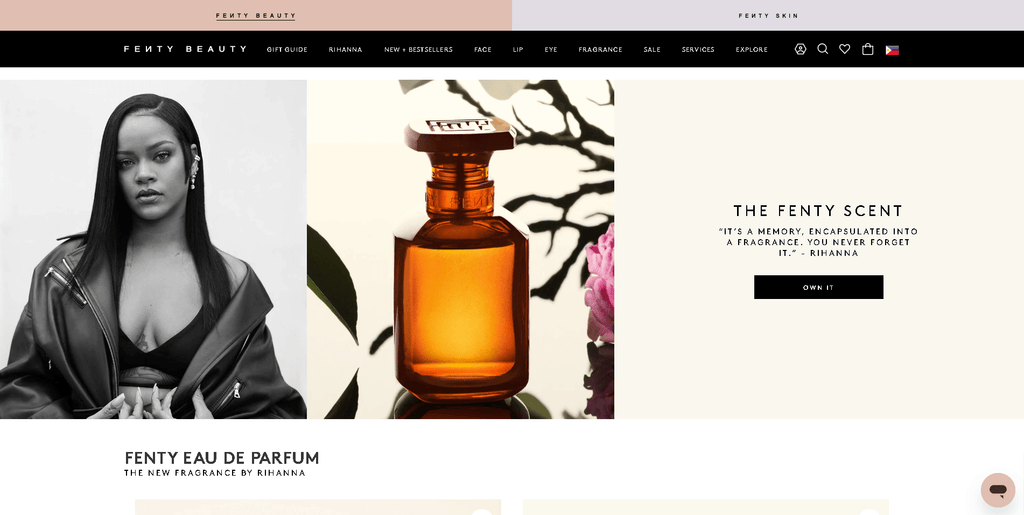
The Fenty Beauty is as refined and classy as Rihanna, the brand's mogul. The website makes it simple to navigate the brand's extensive product line, which includes Fenty Skin, the brand's newest focus.
Fenty Beauty excels at a few things:
- With clear static tabs at the top of every page, it's simple to switch between Fenty Beauty and Fenty Skin.
- Users can use the Shade Finder Quiz to confidently order products without having to shade match in-person.
- PDPs with UGC and the ability to upload your own from multiple sources.
2. Dr. Squatch
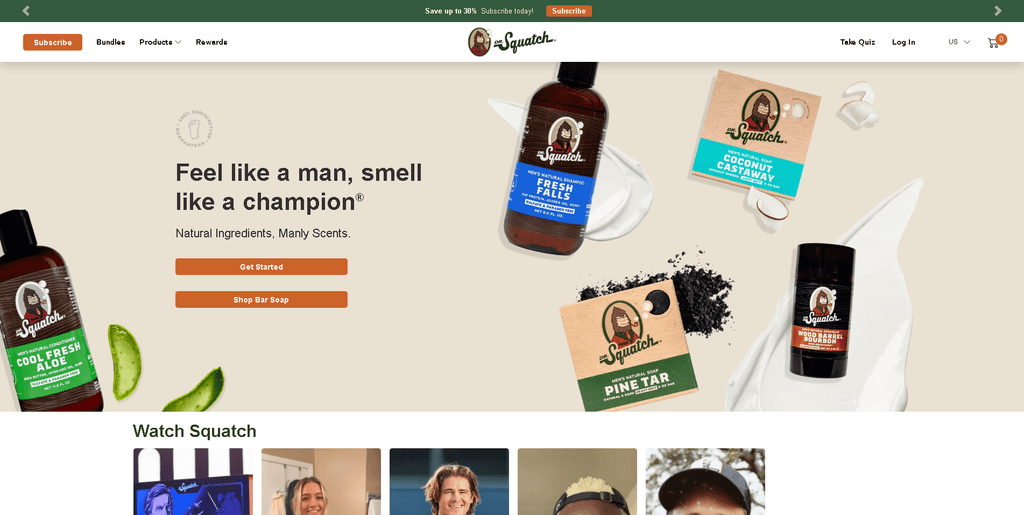
Dr. Squatch Soap Co. is one of the D2C skincare brands that has benefited greatly from a surge in social media word-of-mouth marketing. The once-obscure men's natural soap brand became a hot topic seemingly out of nowhere.
For the "Squatchers," branding is everything. The brand's amusing, user-friendly website is an extension of their lumbersexual approach to making guys smell good.
A few things Dr. Squatch does well:
- To reduce decision paralysis, use simple navigation bundles or products.
- "Squatch Quiz" to assist users in finding their ideal soaps.
- UGC interactive video on homepage to boost confidence and authority.
3. ColourPop
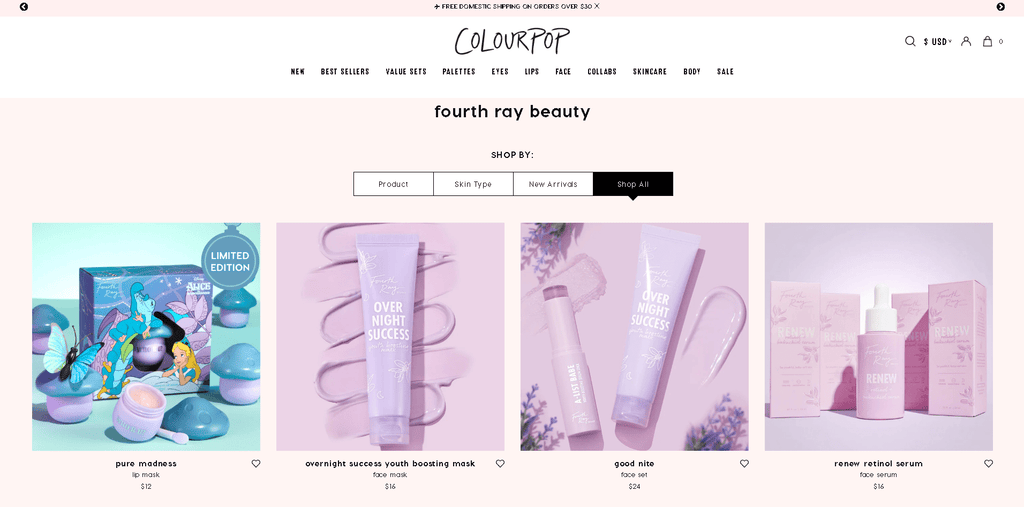
ColourPop skincare business is a social media phenomenon, with a large number of YouTube subscribers and Instagram followers who eagerly await each new makeup release.
The ColourPop captures this sense of excitement in a bright, colorful website that draws customers in and guides them to where they need to go.
What to learn from ColourPop:
- UGC integrated into images on PDPs.
- Comprehensive information on products, including palette shadow descriptions, texture information, application tips, and ingredients lists.
4. Kylie Cosmetics
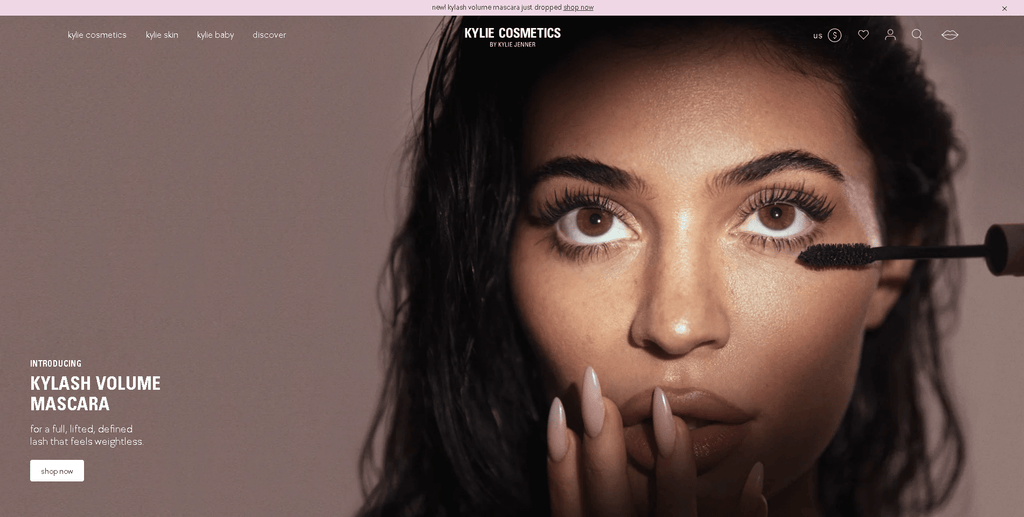
When Kim Kardashian's younger sister first appeared on the scene a few years ago, nobody was shocked. Even yet, it's difficult not to be astounded by the notion that she stands to become one of the youngest billionaires in history.
The Kylie Jenner Instagram experience seems to have organically continued on the Kylie Cosmetics. It is rich and lovely.
What we love from her store:
- Teasers of upcoming releases, drawing customers in right from the homepage
- Clear images on the homepage of what products look like once applied
- SMS marketing
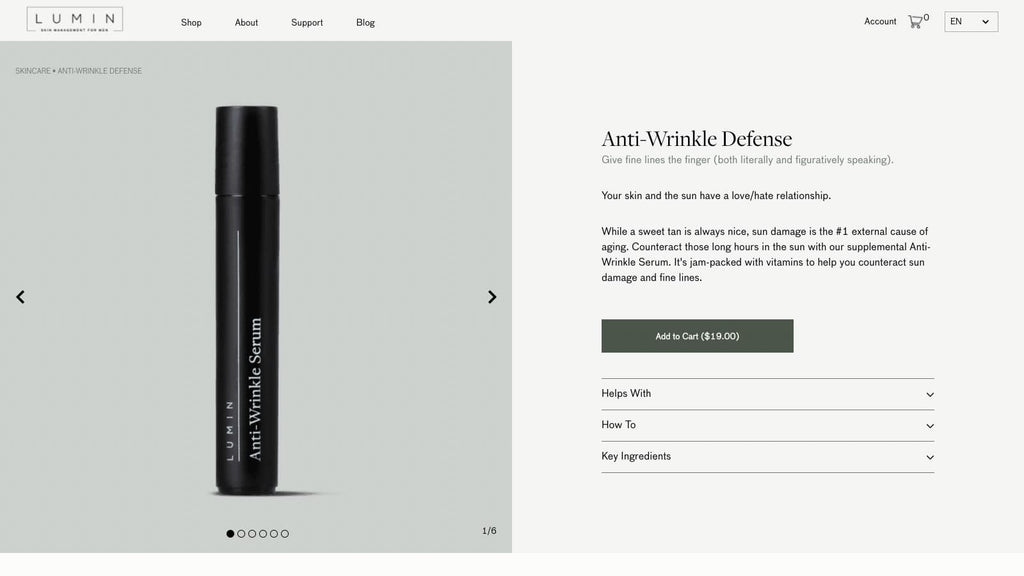
Men's skincare line has been growing in popularity, and Lumin takes it to the next level. Lumin's "premium care for premium men" branding allows their A-Z skin management solutions to shine through.
Their sleek website design is jam-packed with all the necessary details and guides to help every man find his ideal self-care routine, from head to toe.
What to learn from Lumin:
- For first-time visitors, the homepage content and product offering are very clear.
- With the press section and brand background, this immediately establishes legitimacy and authority.
- Product detail pages with accordion drop-downs that are clear, organized, and to the point.
6. Morphe
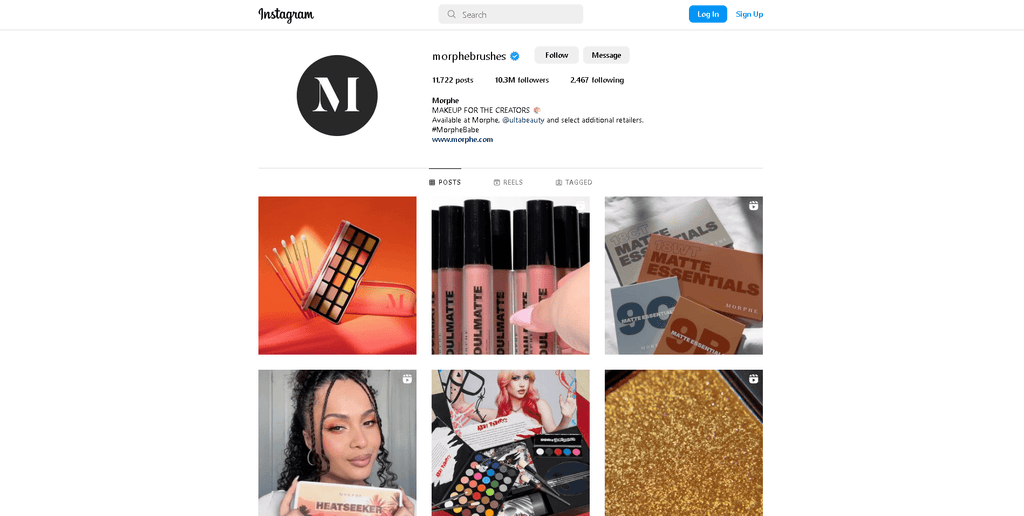
Morphe skincare business grew in popularity alongside makeup tutorials on YouTube. They specialize in professional yet affordable makeup for beauty influencers and creators.
Morphe sells makeup from 29 different brands on their Shopify Plus site and currently has 10.3 million Instagram followers.
A few things Morphe does well:
- Clever, casual, and hip copy on the homepage that humanizes the brand.
- Collabs section for customers to be able to shop their favorite influencer's line.
- "Add your photo" button to share your own UGC to the homepage.
7. Pixi Beauty
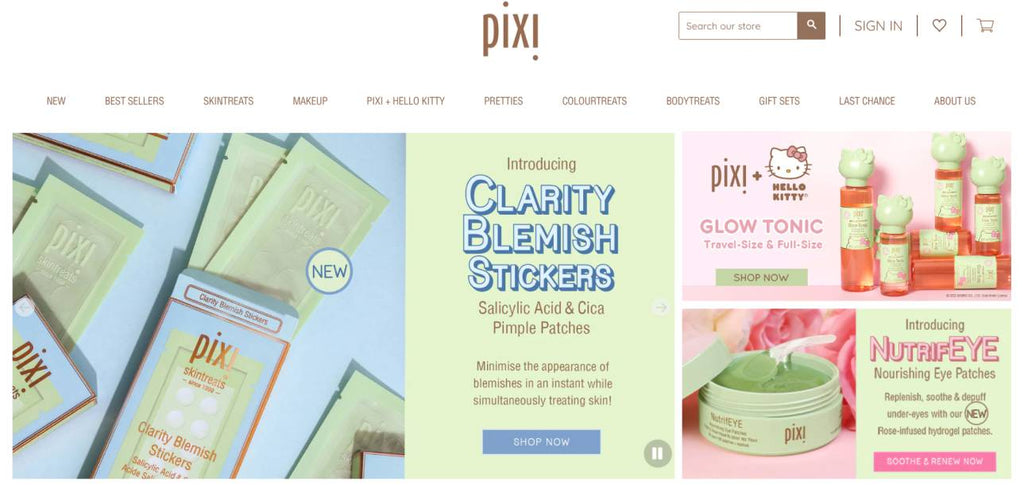
Pixi Beauty, which was founded over 20 years ago, is an extremely successful beauty brand that produces both makeup and skincare products. Pixi has a worldwide following of loyal customers who support the brand because it focuses on enhancing your features rather than covering them up.
However, loyal customers do not always stay because they love your brand, which is why they have a loyalty program in place. LoyaltyLion, one of our favorite integrations, is used by Pixi. Customers can earn more points as they buy more, which is a clever way to encourage retention. Because LoyaltyLion has a strong integration with Shopify, it is the ideal platform for implementing effective loyalty programs.
8. Ren Skincare
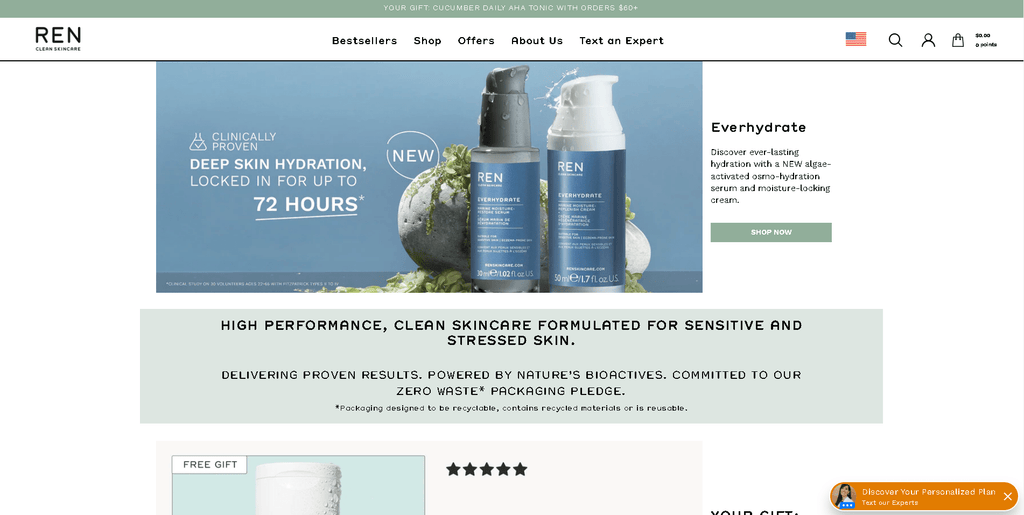
REN skincare, founded in 2000, was designed with sensitive skin in mind. REN was founded by a pregnant woman who discovered that "natural" skincare did not always mean suitable for all skin types, leaving a gap in the market for gentle and effective skincare products. REN skincare is animal cruelty-free and contains bioactive ingredients.
9. theBalm
Shopping on theBalm is similar to going to your local drugstore to peruse the brightly lit beauty aisle. You can grab what you need and leave in a flash, or you and your bestie can have fun digging through the youthful, kitschy makeup displays. This website combines fun and functionality—it's useful, but always entertaining.
What to learn from theBalm:
- A shoppable Instagram feed.
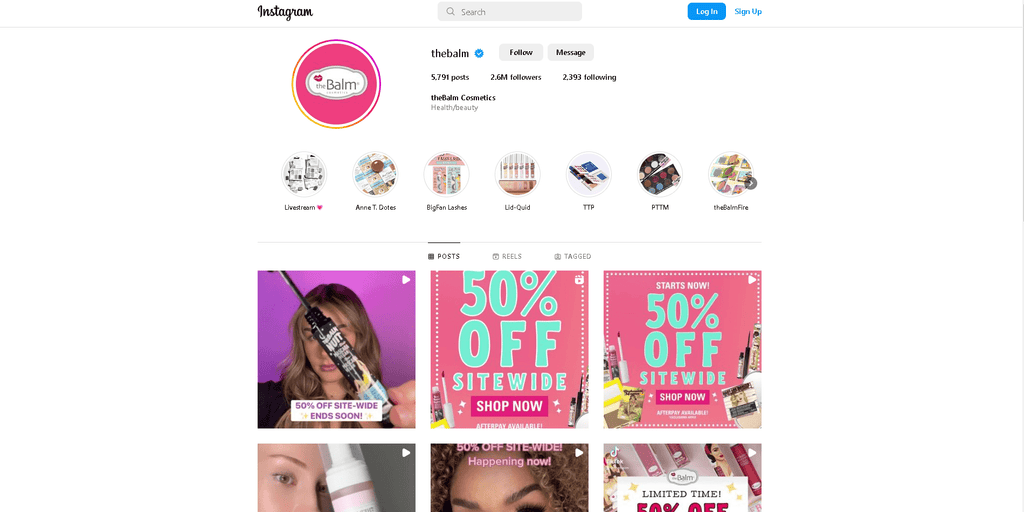
- A community-oriented loyalty program.
- "Clean & Green" – theBalm's clean beauty and green packaging initiative in accordance with the Environmental Working Group.
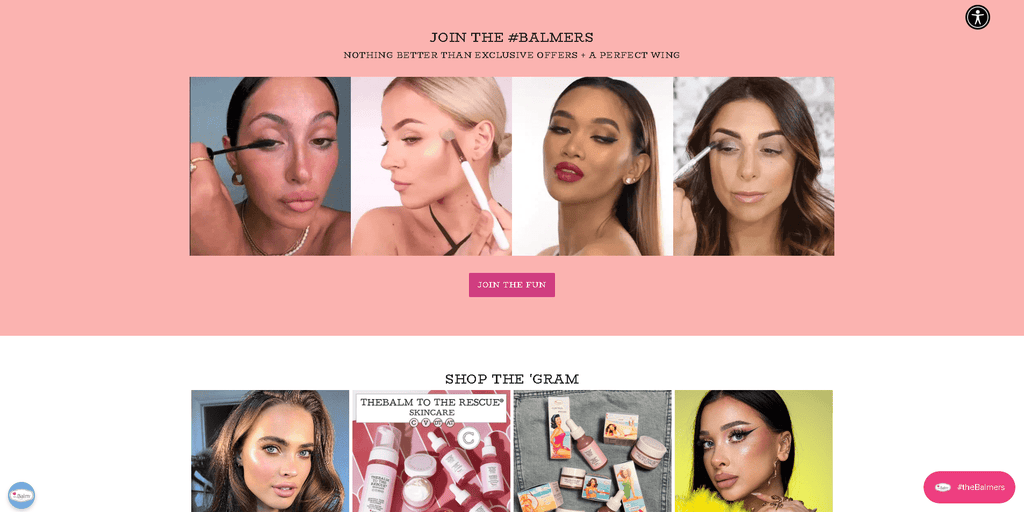
Conclusion
There you have it, everything you need to know on how to start a skincare line.
With the skincare industry rapidly expanding, now is an excellent time to launch your skincare brand into the world.
Although the niche is competitive, there is still room for new players who are eager to capitalize on trends and fill beauty industry gaps.
In summary, here are all of the steps to creating and selling your own skincare brand online.




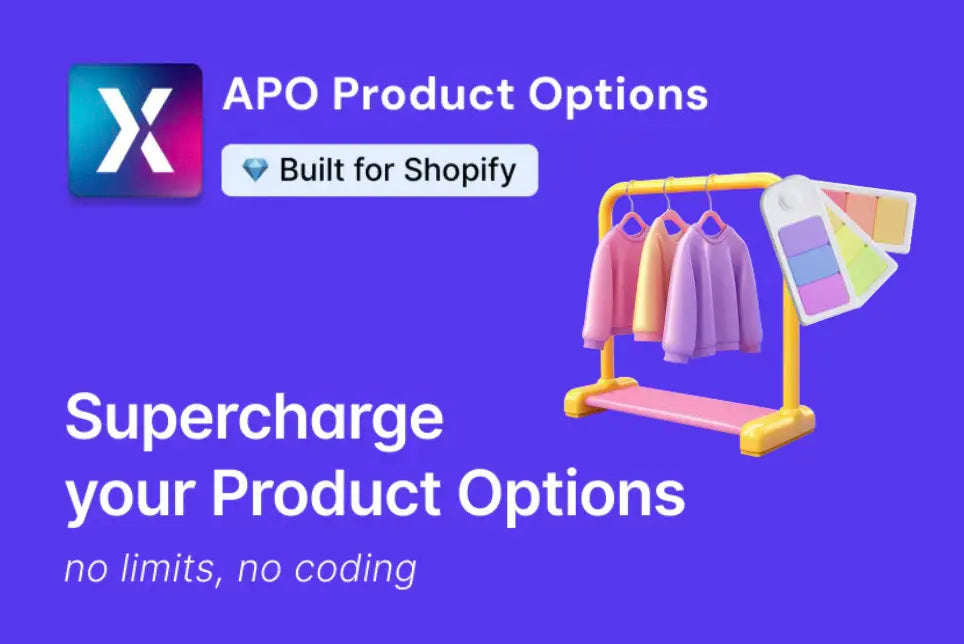
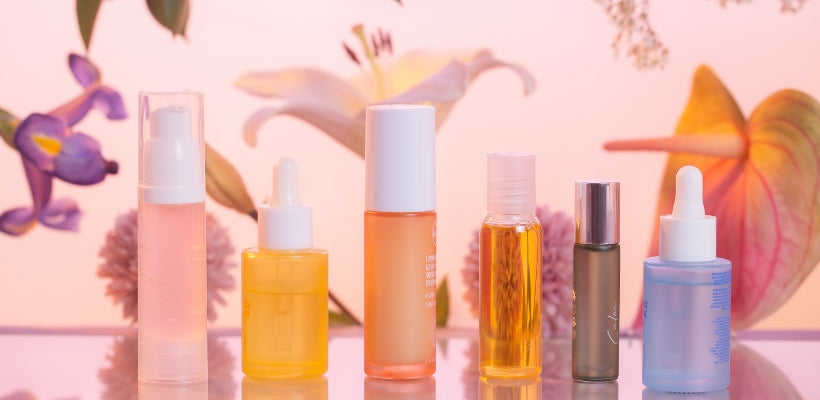



![14 Profitable Small Food Business Ideas for 2025 [Real Numbers]](http://pagefly.io/cdn/shop/articles/1_58b587d2-13db-4aa6-8c19-e40f5c88d3eb.jpg?v=1758255771&width=4460)
![Art Business Names: 350+ Ideas + Free Generator [2025 Updated]](http://pagefly.io/cdn/shop/articles/art_business_name_e94a54e9-d325-4ba3-94ab-7b4297952312.png?v=1760062968&width=1640)
